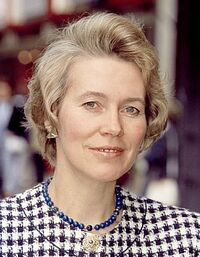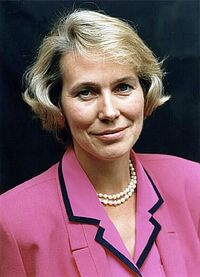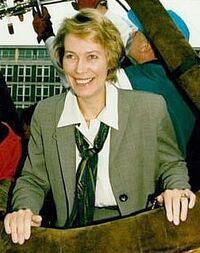Sáe Nyran: Difference between revisions
(Created page with "{{Gylian name|Nyran|Sáe}} {{Infobox officeholder |name = Sáe Nyran |image = SáeNyran.jpg |image_size = 200px |office = Pre...") |
mNo edit summary |
||
| Line 40: | Line 40: | ||
===Government formation=== | ===Government formation=== | ||
Sáe was an unusually active president | Sáe was an unusually active president. She took on a high profile and sought to use her office to combat the [[wretched decade]], while avoiding the pitfalls that had marred her predecessor [[Len Resis]]' efforts. | ||
At the start of her term, she was faced with the ongoing deadlock caused by the [[Gylian federal election, 1985|recently-elected]] {{wpl|hung parliament}}. She suspended [[Cabinet of Gylias|cabinet]] meetings until the [[Aén Ďanez government]] had been removed, and spent her first three months closely involved in attempts to form a new government. | At the start of her term, she was faced with the ongoing deadlock caused by the [[Gylian federal election, 1985|recently-elected]] {{wpl|hung parliament}}. She suspended [[Cabinet of Gylias|cabinet]] meetings until the [[Aén Ďanez government]] had been removed, and spent her first three months closely involved in attempts to form a new government. | ||
Revision as of 10:25, 5 July 2022
Sáe Nyran | |
|---|---|
 | |
| President of Gylias | |
| In office 1 February 1986 – 1 February 1991 | |
| Prime Minister | Aén Ďanez Filomena Pinheiro Mathilde Vieira |
| Preceded by | Len Resis |
| Succeeded by | Anina Bergmann |
| Personal details | |
| Born | 9 April 1949 Dáuzas, Free Territories |
| Political party | Civic National Party |
Sáe Nyran (born 9 April 1949) is a Gylian academic and politician. She served as President of Gylias from 1986 to 1991.
Early life
She was born on 9 April 1949 in Dáuzas. Her parents were a teacher and trade unionist, and a social scientist.
Her given name was originally "Sæ", but she later had it legally changed to reflect her preferred pronunciation.
She was educated in volunteer classes in the Free Territories, and then transferred to formal education after the Liberation War. She attended the Federal University of Mişeyáke, graduating with a BA in sociology, and subsequently completed an MA in the same field at Anca Déuréy University.
Career
She began work as a social scientist after completing her MA. She has worked as a researcher on child poverty, social worker, and judicial assistant.
She was also an activist, regularly attending communal assemblies and serving on the municipal and regional advisory councils.
Politically active, she joined the Civic National Party.
Presidency
Election
Sáe was chosen as the National Bloc's candidate in the 1986 presidential election. She won a plurality of first preference votes, but remained neck-and-neck with poet and Senator Phaedra Metaxa all the way to the final round. Sáe defeated Phaedra in the final preferences by only 8.075 votes, the narrowest margin of a Gylian presidential election.
She acknowledged the narrow result in her victory speech, declaring, "I promise I will do my best to earn your trust."
Government formation
Sáe was an unusually active president. She took on a high profile and sought to use her office to combat the wretched decade, while avoiding the pitfalls that had marred her predecessor Len Resis' efforts.
At the start of her term, she was faced with the ongoing deadlock caused by the recently-elected hung parliament. She suspended cabinet meetings until the Aén Ďanez government had been removed, and spent her first three months closely involved in attempts to form a new government.
She put firm pressure on the opposition to overcome its disunity, thus reflecting popular outrage with the continued deadlock. Conscious of Len's previous blunder, she sought to create as wide a grand coalition as possible, including the Non-inscrits that had felt snubbed by Len.
Ultimately, it was the Ossorian war crisis that galvanised the opposition and toppled the Aén Ďanez government. Sáe formed a very good relationship with the Filomena Pinheiro government, resuming weekly cabinet meetings. Sáe and Filomena got on particularly well due to their shared academic backgrounds, although the contrast between the more charismatic Sáe and the more introverted Filomena did amuse the public somewhat.
Public Advisory Council
Inspired by her previous experience, Sáe established the Public Advisory Council in 1987. It became a federal, philosophical counterpart to municipal and regional advisory councils.
Many of the questions she addressed to the Public Advisory Council in its first 2 years concerned socio-political issues exposed by the wretched decade and how to address them.
Public image
Sáe proved a very popular president, and attained a reputation as a restorative public figure as the nation recovered from the wretched decade. She chose to promote national reconciliation and volunteerism during her term in office.
She was Gylias' first conservative office-holder at the federal level, and the resulting importance was not lost on her. While staying above politics as customary, she drew heavily on Gylian conservatism's self-image as elegantly old-fashioned, reasonable adult figures.
Foreign relations
She used the ceremonial functions of the presidency to contribute to repairing Gylias' foreign relations after the wretched decade. She prioritised visiting Gylias' close allies, inside and outside the Common Sphere, to help rebuild relations.
She had considered making an official visit to Ossoria during her term, but ultimately decided not to, reasoning that "nerves were still raw" after the war crisis and thus it risked doing more harm than good.
End of term
Sáe enjoyed high popularity in her last year in office, and was considered a favourite for re-election, especially in light of her razor-thin 1986 victory. However, she announced she would not run for re-election in 1990.
She explained her reasoning in a lengthy press conference: a new decade needed political renewal, especially in light of the recent federal election, and Filomena Pinheiro had similarly bowed out as Prime Minister. Standing for re-election, she said, would mean delaying the renewal and thus the transition away from the wretched decade.
Sáe's decision to step down was unpopular within her party, since the National Bloc had suffered a demoralising result in the 1990 federal election and had been indirectly affected by the dérive au droite.
Post-presidency
Sáe resumed her academic career after the presidency, and would retire in 2009.
She occasionally contributes editorials to conservative newspapers like The Sunday Thought, The Gylian Journal, and The National Inquirer. She has also served a term in the Senate from 1 December 2013 to 1 March 2014.
In recent years, she has advocated strengthening measures to restrict former politicians' possible private careers after elected office, particularly to prevent them from joining private equity firms in any capacity.
Private life
She married at the age of 19, and has 3 children with her husband.
She identifies as an atheist.

